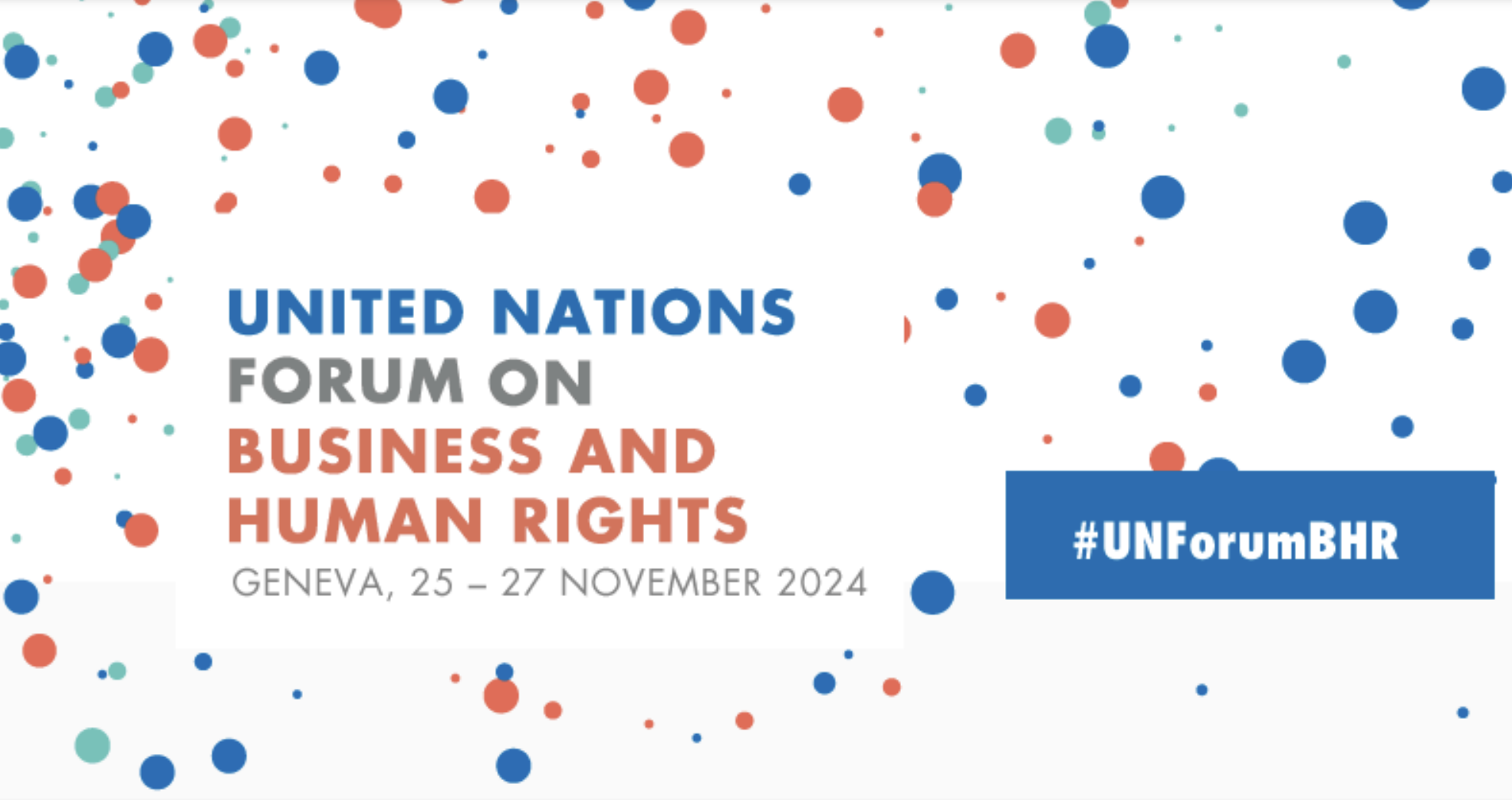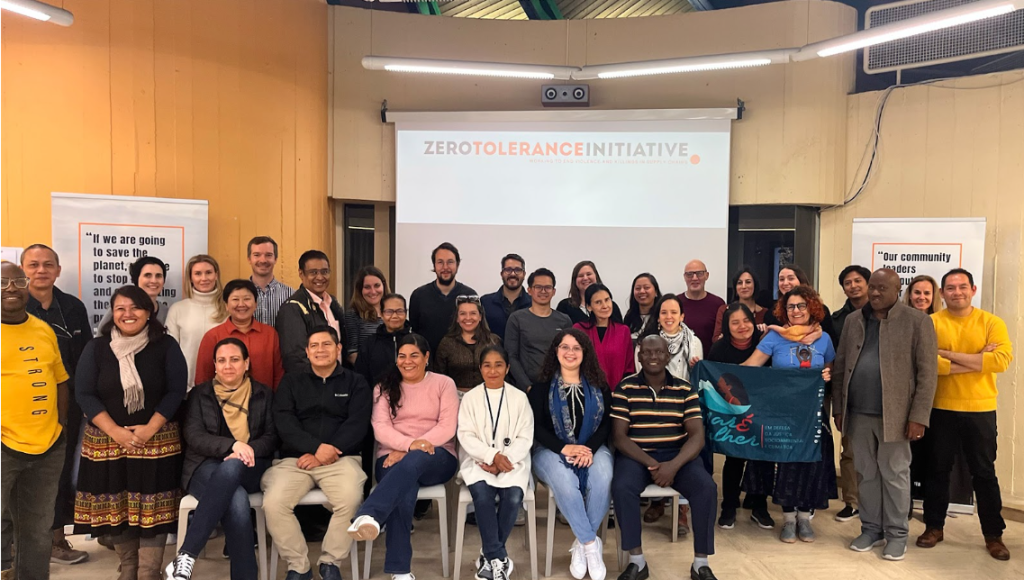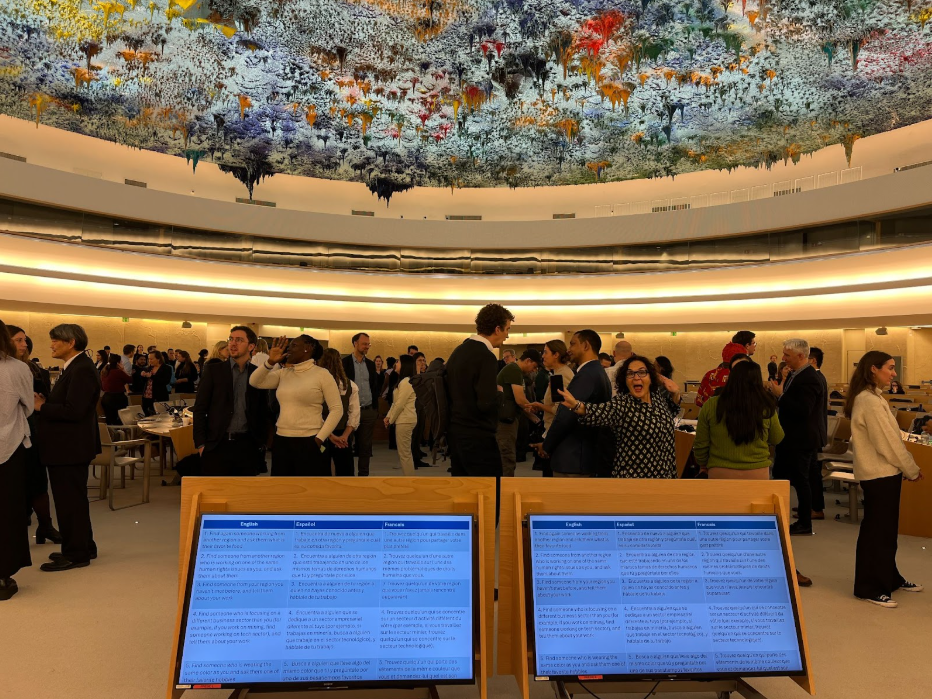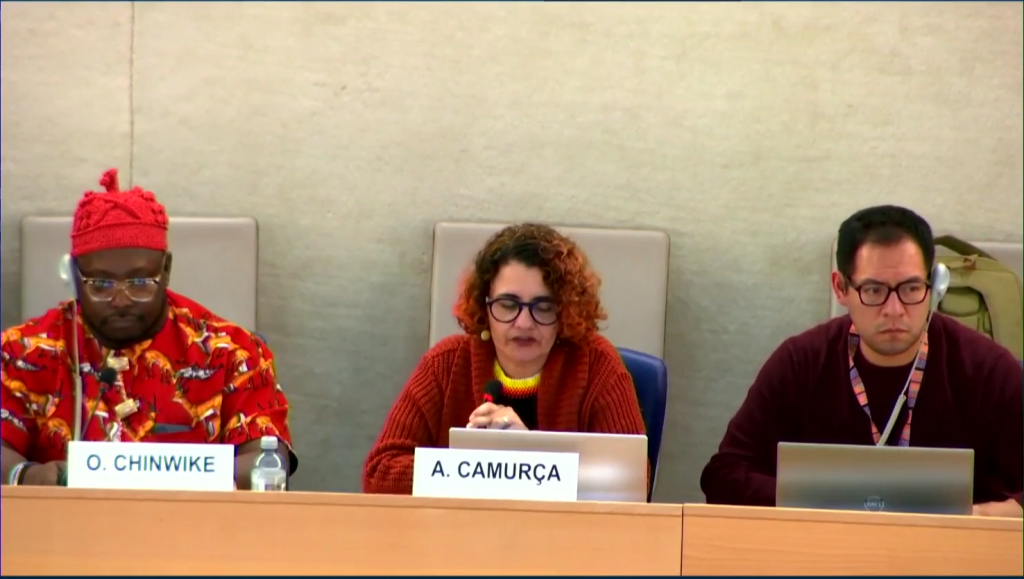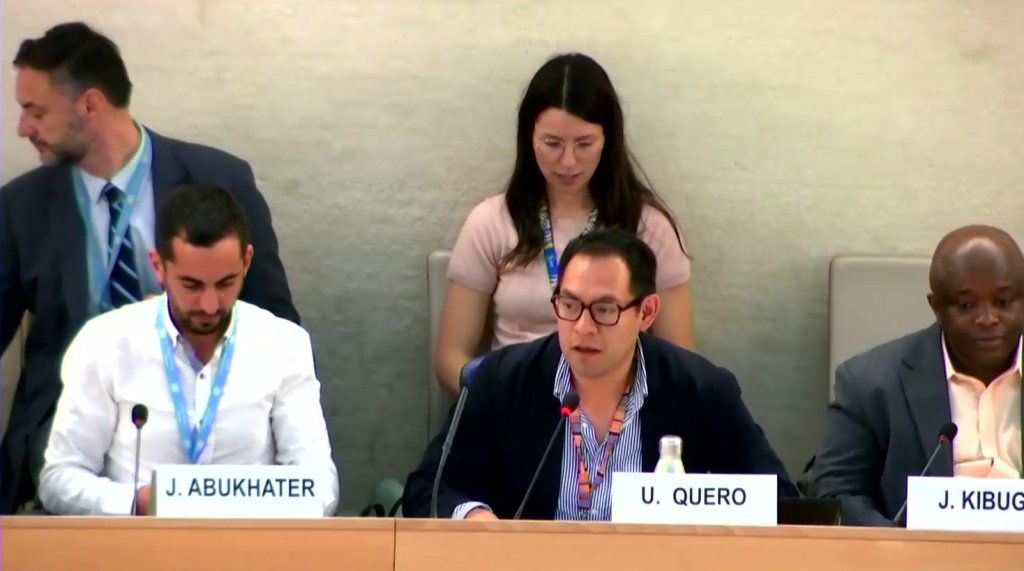From 25-27 November, the 13th Forum on Business and Human Rights took place in Geneva with more than 3,000 participants including human right defenders, State representatives, businesses and other actors. The topic of this year’s Forum was realising the ‘Smart Mix of Measures’ to protect human rights in the context of business activities. ISHR was present and in partnership with human rights defenders and other civil society organisations, we engaged in different activities before, during and after the Forum. At the end of the Forum there was one clear message: voluntary commitments are not enough to guarantee corporate accountability; States need to regulate business with binding rules to comprehensively address the human rights abuses committed by businesses.
Zero Tolerance Initiative annual meeting
The Zero Tolerance Initiative (ZTI) – a global coalition led by Indigenous peoples, local community representatives and supportive NGOs working collectively to address the root causes of killings and violence against human rights defenders linked to global supply chains – had its membership meeting some days before the Human Rights Council. ISHR has been a member of the initiative since it started in 2019 with the Geneva Declaration.
The meeting gathered for the first time after 5 years some of the members and helped to analyse the achievements, challenges and priorities for ZTI. One of the main topics that were addressed was the situation of environmental human right defenders alongside the climate and environment agenda. This meeting also helped to identify priorities and key messages for the following days particularly on the need to strengthen business policies to protect and respect the rights of human rights defenders.
Human rights defenders and civil society hub
For the first time, the Forum created new spaces for networking and exchange between some stakeholders. ISHR and the Business and Human Rights Resource Centre organised the hub for human right defenders and civil society organisations.
Despite the language barriers, this space gave participants the opportunity to exchange about the work they are doing and also to find potential collaboration with defenders and organisations from other regions. This space also helped to meet defenders working on different areas and issues, including digital rights, racism, environment and climate justice, Indigenous issues, etc. While many of them were working on different areas, it was clear that everyone in that room was pushing for the same goal: corporate accountability.
Human rights defenders continue to be at risk despite the ‘Smart Mix’
ISHR, as a member of the Zero Tolerance Initiative, helped organising of one of the main panels during the Forum, titled: ‘Have Smart Mix measures worked for (W)HRDs, Indigenous Peoples and Afro-descendant communities?’ The discussion aimed to share experiences and highlight challenges in the implementation of Smart Mix measures when it comes to the protection of human rights defenders, questioning also if the existing measures have helped to decrease the number of attacks against them.
The first panelist, Andrea Camurça, Coordinator of Territorial Rights at Instituto Terramar and a women’s rights defender from Brazil, addressed the detrimental effects of large-scale development projects on Afro-Brazilian and Indigenous territories. She highlighted the specific impacts of industries such as petroleum, mining, agroindustries, tourism, and renewable energy. She also condemned the criminalisation of defenders and the systematic violations of the right to free, prior, and informed consent, with particular emphasis on the gendered aspects of these violations.
Frederick Wilson, Regional Programme Officer for the Human Rights and Advocacy Programme at the Asia Indigenous Peoples Pact (AIPP), followed with an intervention on the shortcomings of current policies regarding Indigenous peoples’ participation in development projects. He focused on the challenges of ensuring transparency, meaningful engagement, and meaningful participation. He pointed out that, under the Smart Mix framework, the right to free, prior, and informed consent is often not guaranteed, exacerbated by issues such as lack of representation, as well as language and cultural barriers.
Rachel Cowburn-Walden, Global Head of Sustainability at Unilever, stressed the company’s commitment to moving from voluntary to mandatory human rights due diligence. She also called attention to the critical gaps that still need addressing, including the provision of effective remedies and ensuring the meaningful and safe participation of right-holders. She discussed Unilever’s publication of the ‘Principles in Support of Human Rights Defenders,’ which extend to their supply chain and emphasise the protection of human rights defenders. She also raised concerns about the use of Strategic Lawsuits Against Public Participation (SLAPPs). In closing, she made a public call for other businesses to adopt comprehensive protection policies, urging a broader shift towards systemic change at scale.
Pauline Gothberg, National Coordinator of Swedish Regions, emphasised the responsibility of States to protect human rights, extending this duty to their commercial activities and public procurement processes. She underscored Sweden’s commitment to public healthcare, stressing that the supply chain is not immune to human rights violations. To address these issues, Sweden has incorporated due diligence requirements into contracts, along with protection clauses for human rights defenders. She also highlighted that Sweden mandates suppliers to engage in meaningful dialogue with right-holders and ensure the provision of remedies.
Online platforms and racism in the context of content moderation
ISHR participated in the moderation of the session –Addressing Racism Online: A Smart Mix of Measures for Rights-Respecting Content Moderation’. The panel’s purpose was to analyse current content moderation initiatives addressing incitement to hatred and discrimination targeting people of African descent and ethnic and racial minorities on social media, identifying good practices and challenges, and exploring a smart mix of measures to protect human rights on online platforms.
The first panelist, Jalal Abukhater from 7amleh, emphasised that the digital space has increasingly become a battleground for racism, incitement to genocide, and dehumanisation, with particularly severe consequences in Palestine, where online hate speech and incitement to violence are widespread. He highlighted the role of social media in previous instances, such as the role of online platforms in the spread of anti-Rohingya hate speech in Myanmar (2017) and against the Tigrayan community in Ethiopia (2020-2022), where algorithmic systems amplified racist content, leading to real-world violence. He stressed that there is a systemic failure in content moderation, especially for non-English languages, where tools are often inadequate or applied inconsistently, noting that the rise of generative AI is further aggravating the problem by reinforcing harmful stereotypes and escalating online toxicity. To address these issues, he recommended developing hostile language classifiers and lexicons for underrepresented languages like Hebrew and Arabic, ensuring social media companies conduct regular human rights due diligence, promoting algorithmic accountability, and creating accessible mechanisms for affected communities to report harmful content and seek redress.
Tara Fischbach, Public policy manager for Community engagement and Advocacy for Meta, stressed the company’s responsibility to respect human rights across its operations enshrined in the Meta’s Corporate Human Rights Policy, adopted in March 2021. The policy, embedded in the Code of Conduct, recognises the inherent dignity and equal rights of all people, emphasising non-discrimination as a fundamental principle. It covers human rights due diligence, remedy mechanisms, protection for human rights defenders, and governance. In terms of content moderation, she stated Meta’s commitment to strike a balance between safety and free speech, continually learning and iterating to address new challenges and noted what content is allowed on Facebook and Instagram, with explicit policies against racism and hate speech aligned to international standards.
The panel counted with the participation of Montserrat Rovalo, human rights expert from the Permanent Mission of Mexico. In her intervention, she recognised the main challenges surrounding freedom of expression versus the right to non-discrimination including balancing legal protections for free speech with the need to prevent abuse, particularly in online spaces. She stressed that there is a persistent denial of racism, particularly against Indigenous and Afro-Mexican communities, compounded by the invisibility of these groups and rising xenophobia, highlighting that this discrimination is amplified in online spaces, where platforms face difficulties adapting their policies to address contextual, cultural, and linguistic nuances. She shared good practices the Mexican government has taken to prevent discrimination, such as partnerships with Consejo Nacional para Prevenir la Discriminación (CONAPRED) and Twitter to address discriminatory speech, and public education campaigns promoting diversity. Finally, she made recommendations to States to set clear regulations, fostering platform self-regulation, increasing transparency and monitoring, and investing in digital literacy and human rights education at a multilevel cooperation.
Joseph Kibugu, Africa & Middle East Regional Manager for the Business and Human Rights Resource Centre stressed that the digital divide is a significant issue, particularly along race and gender lines, with the Global North having far greater access to digital technologies than the Global South, a dynamic impacting systemic racism. He highlighted that data from the past decade reveal that 70% of tech-related human rights violations are linked to companies headquartered in the Global North, with a disproportionate impact on communities in the Global South. He denounced the firing of tech workers who protested complicity in the Palestine conflict, and biases in facial recognition technology, which performs poorly on people of colour, further perpetuating harmful stereotypes and inequalities. He called on tech companies to ensure their platforms do not perpetuate racism and to address biases in their products and practices, actively working to use technology to undo systemic racism, as digital technology has the potential to promote equity and address historical injustices.
Exchanging experiences in the context of the Escazu Agreement
ISHR co-hosted an event on the Escazú Agreement to consider how UN human rights mechanisms might be used to support national and regional efforts for ratification and implementation. The event also sought to provide human rights defenders with the opportunity to share lessons learnt and solidarity. One of the conclusions from the conversation was the need for a greater dissemination of information about the Escazú system – including the work of the recently activated Committee to Support Implementation and Compliance of the Escazú Agreement, and of the representatives of the public.
One of the Escazú representatives of the public, Mijael Kaufman, participated in one of the last sessions of the Forum, ‘Transforming Business and Human Rights Commitments into Change through Youth-Driven Initiatives’. Mijael emphasised the urgency needed to address climate change. ‘Time is ticking. We must act fast’, he said. Mijael emphasised the need for the involvement of Global South youth in discussion and decision-making spaces. He also spoke of the mental health impact of living in a time of climate emergency, particularly for young people who have not contributed to the harm burning fossil fuels has caused.
Author
Isabella Matias Heredia
Isabella worked in the field of the rights of displaced populations and with the United Nations High Commissioner for Human Rights. She is interested in activist protection issues, specially the intersection of human rights advocacy and international law, particularly in the protection of vulnerable groups. She aims to contribute to creating safer environments for activists worldwide. Isabella is in her final year of her Master’s degree in International and Development Studies.
Author
Ulises Quero
Ulises leads the work on business, environment, and land at ISHR.
Article also available in


